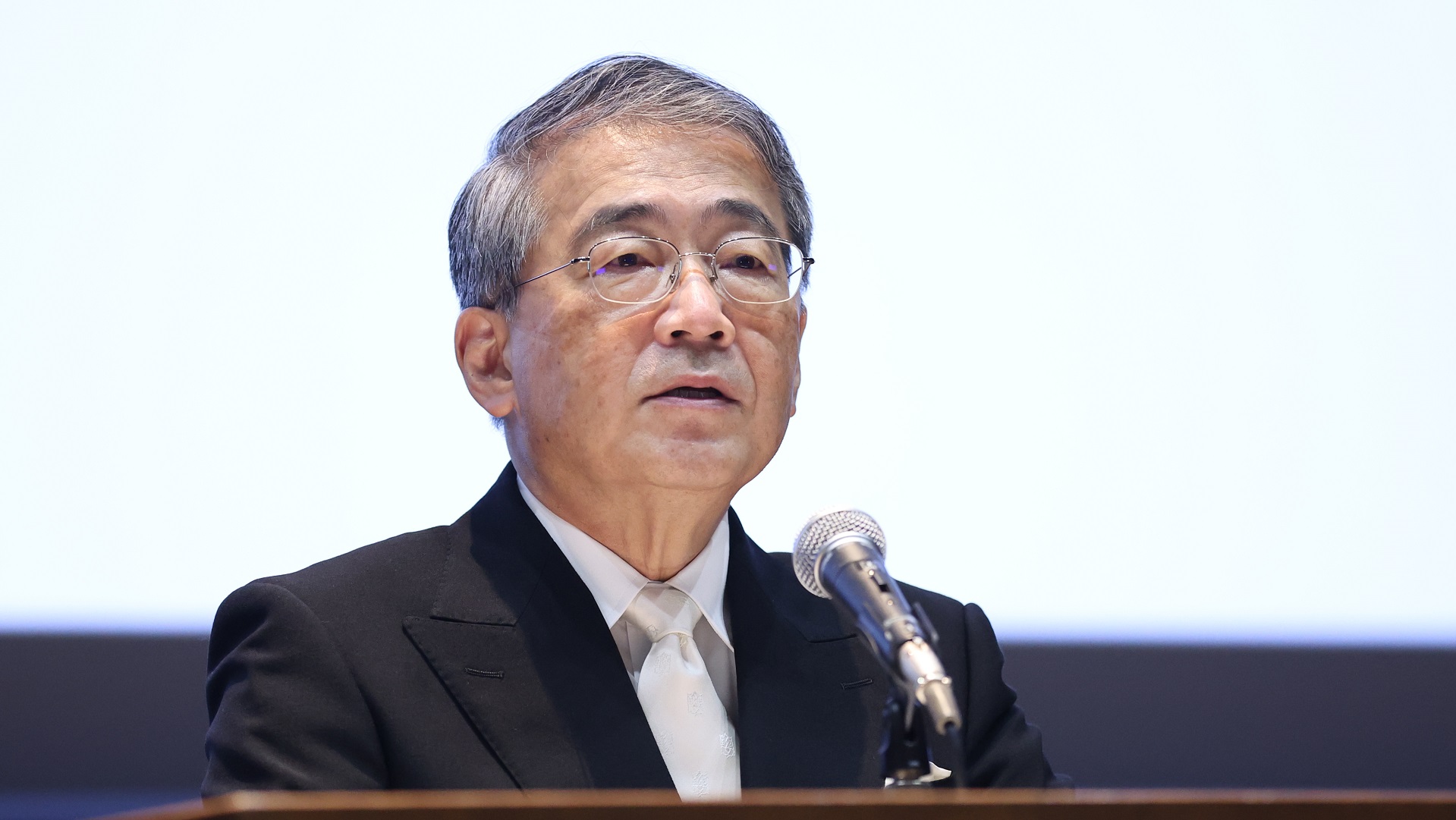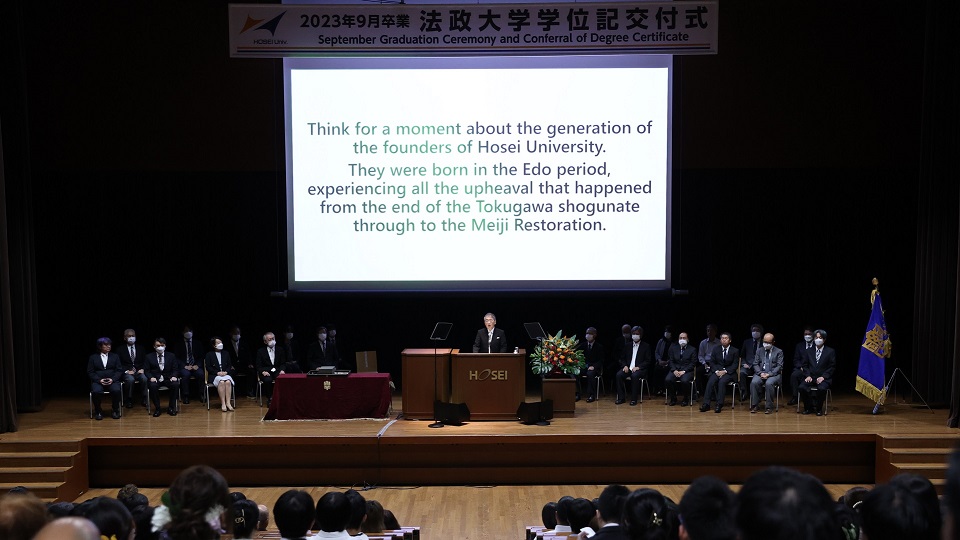News & Event
President’s Address for Commencement Ceremony, September 2023
Congratulations to all the students who are graduating or completing their study program. Congratulations to all your families too!
For all the undergraduate students, the world has changed dramatically over the past four years, due to the global pandemic and major international conflicts. As well as rapidly and profoundly affecting our lives, these events have also reshaped our social and economic systems. Many of you who have just completed a graduate study program probably started experiencing these changes even before commencing your program. Before the pandemic, most of us took it for granted that people could move freely anywhere in the world and that goods could be traded and distributed freely around the globe. These things became totally impossible for a certain period of time. The development of global free trade and logistics systems enabled and facilitated the free flow of goods worldwide, and an economic structure was established based on these systems. But suddenly, it all stopped functioning. We felt the impact in a surprisingly wide range of ways. For example, motor vehicle production in Japan had to be scaled back due to shortages of imported components, and restaurants had to change their menus in response to shortages of some ingredients.

University students, especially those who planned to study abroad, were greatly affected. Many Japanese students had to give up their plans to study overseas, or at least postpone them. As for students coming to Japan from overseas, a significant number of international students at Hosei University had to take their classes remotely from their home countries despite being regular enrolled students, because they were not permitted to enter Japan. Then in 2022, some students were forced to cancel their study abroad programs abruptly and return to their home countries for security reasons following the outbreak of international conflicts.
If you look back over your lives as students over the past few years, I imagine that many of you had your plans or dreams frustrated by these events. At the same time, you have witnessed changes that will greatly impact every aspect of our society over the coming years. The fact that you experienced this directly and personally is a valuable thing for you. From your own experience, you have realized that what is “normal” at one time will not always be “normal” at other times.
In life, the opportunity to experience something that was previously “normal” but is now no longer “normal” very much depends on the era or times that someone is living through. Think for a moment about the generation of the founders of Hosei University. They were born in the Edo period, experiencing all the upheaval that happened from the end of the Tokugawa shogunate through to the Meiji Restoration. And then they experienced the rapid progress of modernization. Amid these dramatic changes, they did their best to play a positive role. As the fruits of their efforts, they launched the first private law school in Japan, which later developed into Hosei University. On top of their own success, they inspired others to action too, by showing that it was possible to create a private law school. As a result, various other law schools were set up in Japan, many of them later becoming large private universities. From the limited efforts of these young people of the Meiji period who started a single law school, an important pillar of higher education in Japan was established.
All of you who are graduating or completing your studies today have understood, through your direct experience, that the “normal” reality of the world will not remain “normal” forever. And you are now moving into a future in which many profound changes are likely to occur. The outbreak of new types of infectious diseases and the eruption of international conflicts are very real possibilities in the coming years. We all have realized that there is no guarantee that the conditions supporting the “normal” reality of today’s world will continue indefinitely. Consequently, the ways in which people make decisions and initiate action will change. In turn, this will lead to changes in how the world works. Like this, we are about to enter an age in which constant and dramatic change is the norm.
What happens if all the conditions that have supported the “normal” reality up to now are suddenly lost? The challenge is then to try and prevent severe impacts on various parts of society. To do this, we need to reshape the systems of the world to make them more resilient against such changes. Over the coming years, all of you will probably play some part in this work of restructuring in different parts of society.
It is normal that work on one small part of society does not directly address the big challenge of reshaping society as a whole. Even in today’s complex world, however, efforts to solve a specific, small problem in one place can end up changing the way the whole world works. This spring, one of our alumni, Masahiro Hara, received the Imperial Prize and Japan Academy Prize. He won these prestigious awards for his contributions to the development and worldwide dissemination of the QR code system . The QR code, which most of you probably use on a daily basis, was developed by Mr. Hara.
After graduating from Hosei University, Mr. Hara went to work as an engineer at Denso, an automobile parts manufacturer. The barcodes used to manage parts had a limited information capacity and they were easily affected by dirt, so the company wanted to improve the technology somehow. The QR code was invented as the result of a proposal by Mr. Hara. Originally, it was developed to enable the company to exchange information quickly and accurately with customers. In other words, the QR code system was a means of communicating business information between companies. But thanks to the company’s decision to make the new technology available license-free, the QR code was adopted for new applications in a wide variety of other fields. The uses and possibilities of the QR code have continued growing to the present day. Making the QR code license-free meant more than just letting anybody use it for free; getting it widely used for so many different applications was also an effective and essential way of improving and advancing the technology to a higher level. Wider use resulted in more feedback from a greater variety of users, enabling the technology to be refined. So, what was initially developed to solve a small, local problem eventually became a universal technology used daily by countless people all over the world.
If the QR code was only used by Mr. Hara himself or the company he worked for, the technology would probably have ended up as a specialized invention used only for business-to-business transactions. In this case, most of us would never have even heard of it. Instead, the QR code system was made freely available to people with expertise in other fields, and Mr. Hara worked continuously to solve new challenges that were noticed with the technology. These efforts led to further improvements in the QR code system, making it easier to use and opening the way to its global popularity. Instead of taking on the challenge by themselves, the company enlisted the help of a diverse group of people from many different fields to advance the technology and promote its implementation for countless applications. I think that there is a very significant message in the fact that Mr. Hara’s recent prizes were awarded not just in recognition of his development work, but also for his contribution to the worldwide dissemination of the technology.
There is a limit to what any of us can do by ourselves. By cooperating with others, however, we expand the potential of what we can achieve beyond our individual limits. So, how do we create collaborative relationships with others? By cooperating with other people who have abilities that we lack, we can accomplish things that we could never do alone. Through this kind of process, a small, individual solution to a problem can potentially end up changing the whole world for the better. Mr. Hara’s prizes are a lesson for all of us.
As you all know, the Hosei University Charter is centered on the concept of “Practical Wisdom for Freedom.” One of the key aspects of this practical wisdom is the wisdom of cooperating with others. The Charter ends with the words, “In cooperation with its many graduates, who have the ability to live anywhere in the world, Hosei University will contribute to the future of sustainable societies. ” This means that all of you are partners in solving the challenge envisioned in the Charter. As we look ahead to a world of major changes, I hope that all of you can play a role in cooperative efforts to tackle some of the pressing problems of our world, in the spirit of the Hosei University Charter. In the meantime, I wish you all the best of luck with your future endeavors. Once again, congratulations!


